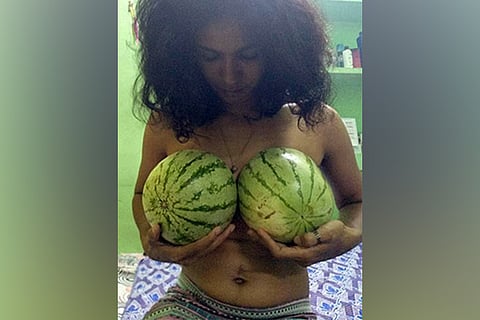

Men’s nipples are ‘normal’ but women’s nipples are a ‘sexual organ’? The double standards in the way women’s bodies are sexualised has led to several protests across the world, and a few women in Kerala are doing the same with a protest of their own. At least two women have posted bare chested pictures on Facebook in recent weeks – and both of their photos were taken down by the social media platform.
The idea for the campaign was floated by a woman named Arathy. Titled 'Maaru thurakkal samaram', which loosely translates to ‘protest to bare the breasts.'
While there isn’t widespread support for the campaign, an activist joined in on Monday after a Kerala professor made derogatory comments about women’s bodies, comparing students breasts to ‘sliced melons’.
Activist and model Rehana Fathima joined the campaign on Monday, with her friend and activist Diya Sana sharing two of Rehana’s photographs on Facebook. One photo showed Rehana holding two watermelons in front of her breasts. The other showed her bare chested, hiding her face with a melon.
"Women, too, should ideally have the same freedom that a man enjoys with regard to his body," Diya wrote on Facebook when she shared the photos. Along with Rehana’s pictures, Diya also posted a picture of herself holding half a watermelon in each hand.
Rehana has been vocal about women’s rights, and has participated in discussions against sexualising the female body. Speaking to TNM, Rehana says that she posted photos to show support to Arathy, who started the ‘Maaru thurakkal samaram’ campaign.
"The message is that there is nothing vulgar about a woman's body. I shared the images to assert that my body is my right, and no one can dictate what is right and wrong. When Arathy began a conversation about this, I was happy to join her. Since I have already been quite vocal about these issues in the past, I asked my friend Diya to share the images. What we should discuss is not the photos per se, but why such a movement is needed," Rehana says.
She adds, "There is no vulgarity in a man's body, but when it comes to women, the standards change. A woman's body is seen as a sex tool and such a public mindset must change. Women's breasts, their sexuality, all of this is only normal. I want this campaign to be a step towards having healthy discussions on the subject."
Taking to Facebook on Monday, Arathy wrote that when she posted her photograph a few days ago, she did not intend to start a protest of any sort. "Now that it has become a movement, let's see where it takes us," Arathy wrote.
Facebook takes down pics
However, hours after Diya posted the pictures of Rehana, the photos were taken down by Facebook. Diya has also been penalised by Facebook – she was not allowed to use her own account for 24 hours.
"In the first hour itself, the post received several comments. While most people supported the campaign, there were also people who abused us mercilessly. They painted us in a bad light,” she says.
The photos were in response to the comments of a male teacher of Farooq college, who said in a speech that Muslim women students of his college did not wear their hijab properly, and exposed parts of their chest “like how we slice a small part of a melon to see if it’s ripe.”
Speaking about the campaign, Diya says that it was not just the Farook college teacher issue that provoked them to join the campaign.
"That incident merely added to it. We have been discussing this for a while now. About how a woman's body is sexualised, while a man's body is not. Why does our society behave in a certain way when they see a woman's breasts? Why are women's breasts sexualised, even when they’re feeding their babies? When people look at a woman's body in such a manner, of course they see only vulgarity. Why sexualise a woman's body? My body is mine!" Diya asserts.
Reacting to Facebook removing the post, Rehana calls it a double-standard on the part of the company.
"Facebook promoted Malayalam magazine Grihalakshmi’s photo of a woman breastfeeding a baby. The same Facebook has a problem when we post photographs of our breasts. Why do people have to term our bodies as vulgar?" Rehana asks.
Criticism for the protest
The photos have created quite a stir on social media, with several people abusing the women – especially Rehana – for posting the bare chested photo. Several commenters criticised both Arathy and Rehana for posting their topless photos, and going against cultural norms.
Critics and feminists have also questioned why Rehana’s photo was not posted on her own account, but on Diya’s – while Diya herself did not participate in the campaign. The fact that Rehana is a model, and that the way her photograph has been taken reinforces the way women’s bodies are sexualised in the media, has also been criticised.
(Edited by Ragamalika Karthikeyan)